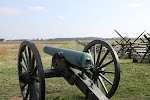How
the troublesome pest ignited violence against lawmen
Lost in the recent national controversies over the use of force by law
enforcement are the sacrifices made by police officers in protecting their
communities. Men and women sacrifice their lives each year chasing bank robbers
and murderers but also while performing mundane tasks like checking on a stranded
motorist. In the early 1900s, a number of officers in the rural South died enforcing
a law many farmers viewed as federal government overreach.
From 1906 to the early 1940s, federal and state governments engaged in a
war against a cattle tick that caused a devastating fever. The law required farmers
to carry their cattle to community dipping vats where the animals were immersed
in a chemical solution to kill the ticks. Many stock owners resisted, claiming
transporting the cattle led to injuries, the chemicals sickened them, and the
time and effort of the process was an annoyance. Cattlemen expressed their
frustrations by refusing to dip, dynamiting dipping vats, burning the property of
pro-dippers and government employees, and hurling threats that eventually
escalated to assault or murder. Destruction of vats continued into the
mid-1930s, but eventually government dissemination of information on the
economic benefits of tick eradication led many skeptics to withdraw their
opposition to dipping.
In the remote rural South, from the piney woods of south Georgia to
Louisiana, resistance to mandatory treatment of cattle was strong and at times violent.
Farmers





















